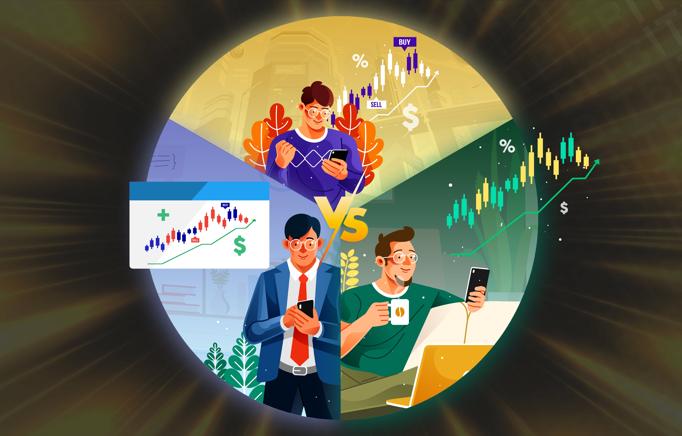Retail, Institutional and High-frequency Traders
Crypto for Professionals
Other articles
Over the years, cryptocurrencies have evolved from facilitating an incognito means of transacting to become regarded as a distinct asset class for investment with unique and alluring characteristics.
The growth of crypto has attracted different types of investors, from beginners and market speculators to the big sharks in the vast sea of crypto, as trading cryptocurrencies and cryptic assets comes with high potential of lucrative returns.
Among the major types of traders in the crypto sphere are retail, institutional and high-frequency traders. There is one main goal of trading crypto and that is to generate profit, but the capabilities of each trading type to generate income is different, as it depends on several factors including the size of capital invested, strategies incorporated and the capacity of data utilization.
What is Retail Trading?
Retail investors or traders are those which trade occasionally using relatively small amounts of money. They are typically non-professional traders and do not consider investing as a full-time job, and online trading for retail investors typically does not represent a major source of income.
In the cryptocurrencies market, retail investors do most of their trading through online crypto exchanges which provides users with the platform to engage in online crypto trading.
Common characteristics of retail traders are:
- Low expertise in financial markets
Typically, retail traders are not much versed with advanced concepts that encapsulate the financial market. It’s the basic and fundamental understandings which usually influence their decisions. This comes with peace of mind as the decision-making process lacks complexity, but this can also give rise to decisions which are absent of well-thought goals and end results.
- Limited research capabilities
As retail traders are generally small-time and novice, they often rely on only a handful of research resources before choosing the asset they would like to trade or invest in. Their restricted research capabilities limit the potential of executing trades which take into account various drivers that may influence the price of an asset.
- Highly influenced by emotions
From the fear of missing out to the envious force of greed, much of the decisions of retail traders may be guided (or misguided) by the influx of emotions. For example, members of a community may hype each other up into buying large quantities of a certain cryptocurrency after the project behind the crypto coin recently went through a major revelation.
What is Institutional Trading?
Following a similar approach to retail investors, institutional trading is when organizations trade large quantities of certain assets. In traditional financial markets which provide investment opportunities in various assets like stocks and commodities, institutional investors have historically been provided with advanced trading options and capabilities.
This includes extended trading hours, wider limits to trade volume and lower trading costs. In the realm of crypto, institutional traders often invest large sums of money and in-turn, influence the price of a certain asset by a great extent. They are large, trusted investors with high market expertise and extensive knowledgeability & research capabilities. Among the most apparent institutional investors are commercial banks, mutual funds, pension funds and insurance companies.
Such institutions serve as a paramount source of capital in the economy. They grow the capital of their clients by effective management and planning. By pooling the funds of their respective clients and effectively allocating them towards assets which can achieve consistent returns, institutional traders attract both small and large-scale investors which seek to generate income on a regular basis.
What is High-frequency Trading?

Also called systematic trading and automated trading, high-frequency trading (HFT) is a type of advanced algorithmic trading method which utilizes powerful computers to conduct a large number of trades in a matter of seconds, or even less.
This type of trading method carefully analyzes heaps of trading data in the form of detailed statistics of order transactions, chart trends and patterns across multitude of markets and exchanges, and does so in lightning speed. HFT systems are consistently evolving to become more complex and more inclusive of different types of data, such as the behavior and habits of investors in good times and bad.
High-frequency trading transacts many orders in very little time, which gives it an advantage over other forms of trading approaches. A simple takeaway; the higher the order execution speed, the higher the profits in general. This is because the orders executed take substantial factors into consideration, which may be redundant if done a minute later for example. These factors are affecting and shaping the market now, and HFT is all about the power of now!
Summary
There are many market participants in the cryptocurrencies market, which is valued at nearly $1 trillion, and the probability of their success is largely dependent on the efficacy of trading or investing strategies incorporated, the amount of funds available and how much data and trend statistics can be utilized.
Mostly, it’s institutional investors which dominate the market space as they typically inject large amounts of money per trade, and that has a greater impact on the price of an asset that from the trades of small-time retail investors. Retail trading is often low-scale and is done by individuals which may or may not have high research competencies which can aid them in their decision-making process.
Whether you are a retail, institutional or high-frequency trader, if things don’t go your way, it may be wise to revise the strategies adopted and perhaps revamp your approach towards engaging in the crypto market. While there are many external factors which can’t be controlled, they can still be accounted for and considered.
Depending on your investment or trading objectives, online crypto trading can represent an alternative source of income, or perhaps a means to generate the main income, but the risks associated are not a force to be reckoned with. Be sure to understand the risks of trading in the volatile market of crypto before tapping into the modern market of lucrative opportunities.


